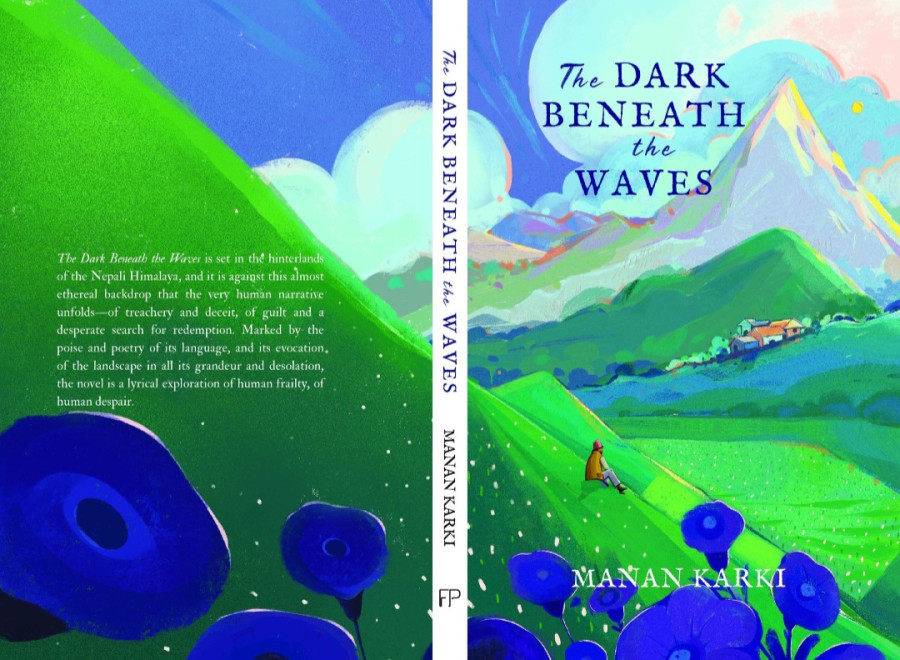Books
A book about everything, yet nothing at all
The Dark Beneath the Waves explores the deep facets of the narrator’s regrets and the human psyche.
Manushree Mahat
As he prepares to recount the dark story of his life, the main character and narrator of ‘The Dark Beneath the Waves’ wonders, “My name is—but what does that matter now, after all these years, after all this?” And it really doesn’t matter, you soon realise that the tale of his shame and woe is so great that perhaps it’s much easier to distance yourself from the disgust of his past misdeeds.
Names, as symbols of identity and humanity, play a crucial role in storytelling. However, it becomes apparent early in the book that the narrator doesn’t see much humanity in himself. In fact, none of the characters, especially those central to his past, like his wife and his brother, are ascribed a name. This distance he maintains from them is fueled by a deep, intense hatred born from their shared betrayal. This situation hints at a psychological aspect we can analyse: the enormity of his past crime has led him to suppress and erase much of its impact. This unravelling of the narrator’s mind is a central theme in Manan Karki’s book, depicted vividly at times but occasionally feeling a bit confusing.
Karki’s narrative technique involves unravelling the fragments of the narrator’s life through poetic inner monologues. His writing style can be likened to a fever dream or puzzle pieces slowly coming together to reveal a profound truth. However, the narrative’s complexity can be challenging to follow, as the narrator shifts between different timelines. We see him living a new life as a village doctor in the present, while simultaneously facing accusations of aiding government soldiers. Yet, in the next moment, he revisits his past life as a sadhu, on the run from authorities, and residing in an ashram.
The narrator is portrayed as a villain and an unreliable storyteller, and Karki maintains a precarious balance between vividly describing the narrator’s crimes in all its gory details while also attempting to humanise him. The narrator embodies a self-fulfilling prophecy, labelled ‘Asvatthama’, due to a distinctive diadem-shaped birthmark on his forehead. This name draws parallels to a character from the Mahabharata, Asvatthama, who fought for the Kauravas and attempted a heinous act. This clever and on-the-face connection foreshadows the narrator’s actions but might come across as somewhat obvious. Readers familiar with the Mahabharata will easily recognise the significance and likely guess the narrator’s terrible deed. Karki doesn’t intend to keep the narrator’s past a mystery; he doesn’t mind if readers figure it out early because the real focus of the book is on the ‘how’ rather than the ‘what’.
The narrator is deeply wicked, brimming with bitterness, anger, and hatred to an extent that renders him beyond redemption. He commits a horrific act by killing his wife out of cold-blooded hatred, using poison and suffocation, after discovering her affair with her cousin brother. What’s even more disturbing is that he takes this extreme step upon learning of her pregnancy with her brother’s child, seeing it as a personal attack on his own masculinity. He says, “But I could never bear the thought of her being yours—completely and unequivocally yours.”
The murder is described in such gruesome detail that it becomes evident the narrator’s quest for redemption is futile. Karki’s intention isn’t to redeem the narrator; instead, it’s to make him endure the greatest punishment—to live without the death he desperately desires, with only his despicable self and haunting past as company, much like Asvatthama.
The character of Bhusya further highlights the narrator’s destined suffering. Bhusya, who could be seen as the narrator’s companion and adopted son in a way, brings a humanising aspect to the narrator’s character. The narrator takes care of Bhusya, providing him with food and shelter, only for Bhusya to meet a tragic end. It’s possible that adopting Bhusya was the narrator’s attempt to make amends for the unborn child he heartlessly killed.
We can question the sincerity of all the narrator’s actions, considering they all seem connected to erasing his dark past. Is it genuine love if his primary motivation is a selfish desire for redemption? This raises the question: Is redemption inherently selfish? However, the narrator’s love for Bhusya does appear to be genuine, suggesting that perhaps it is his fate, his punishment, to witness the suffering and death of those he cares about while enduring the torment of his own actions.
Karki seems to have a grasp on the story and the themes he wants to explore in ‘The Dark Beneath the Waves’—except for the ending, that is. After carefully exploring the complexities of the narrator’s past, Karki abruptly shifts to summarising the entire story with the quote, “But how do I unravel it all again, where do I begin?” This transition feels abrupt, leading to a narrative that becomes somewhat convoluted as it attempts to introduce numerous elements into a compact 160-page novel. Karki concludes the story by drawing a parallel to Asvatthama, ultimately leaving the narrator unable to attain the death he desperately seeks. Instead, he’s left to grapple with the haunting memories of death and an unrelenting cold hatred towards his brother.
The Dark Beneath the Waves
Author: Manan Karki
Year: 2023
Publisher: FinePrint




 9.7°C Kathmandu
9.7°C Kathmandu










